




In a bid to offer high-quality products, including aromatic incense sticks, at affordable prices to Indian consumers, Mr. Ashutosh Gupta has introduced the Ramodhya brand of incense sticks. Positioned as a value-for-money option, these sticks come in 100g zipper packs priced at ₹25. Gupta, the brain behind the Ramodhya brand, expressed to Sugandh India that the initiative aims to cater to the sizable segment of the population unable to afford premium products due to steep prices. While other brands in the market retail similar quantities for ₹50 or ₹100 in pouch packs, Ramodhya offers its product for ₹25. Additionally, a 50g zip pack is available for ₹10. Gupta elaborated that the Ramodhya brand presently comprises three products: Aastha, Nakshatra, and Mangalam. While plans are underway to introduce dry sticks, dhoop and cones in the future, the company’s immediate focus remains on these three products and three states.
Gupta informed Sugandh India that Uttar Pradesh, Bihar, and Jharkhand, home to 30% of the country’s population, particularly those with limited incomes, constitute the primary target market. Consequently, the company is concentrating its marketing efforts exclusively in these states for the foreseeable future. The driving force behind this venture is to develop a product that boasts superior quality and yet is friendly to the common man. Mr Gupta, with 20 years of marketing experience primarily in FMCG products, recognised the potential for a mass-consumption item that could serve a broad demographic. While soap, oil, and other consumables witness varying degrees of demand, incense sticks and related products enjoy consistent usage among roughly 90% of the population.
Responding to a question, Mr Gupta highlighted the dominance of major players in the industry, producing premium but unaffordable goods for the masses. Ramodhya, in contrast, prioritises high quality and lower prices. Notably, Killer Dragon, Fast Sleep, and Sweet Sleep are the company’s mosquito repellent range that renders mosquitoes unconscious without posing harm to humans. Priced at ₹10, these items offer an affordable alternative to premium offerings, typically priced at ₹70. Mr Gupta revealed his educational background in pharmaceuticals (M Pharma) and business administration (MBA), preceding his foray into entrepreneurship. Plans include diversification into tea, oil, and soft drinks.
Regarding distribution, Mr Gupta outlined a strategy focused on the initial penetration of the three designated states over the next two years, followed by nationwide distribution and export ventures. A network of a hundred distributors facilitates supply chain management within these regions. Despite industry norms favouring extensive product ranges, Mr Gupta advocates for a more selective approach aligned with consumer preferences. He stressed that while numerous options might exist, consumer loyalty typically revolves around a few favoured products. Addressing manufacturing challenges, Mr Gupta acknowledged the prevalence of small-scale producers offering subpar goods at reduced prices. However, Ramodhya prides itself on utilising premium raw materials to deliver quality products at competitive prices.
Mr Gupta acknowledged the formidable presence of established industry giants with decades of experience. Given his relatively recent entry into the sector, he underscores the importance of offering value-for-money propositions to build consumer trust and satisfaction. Additionally, industry challenges such as the ban on the usage of bamboo and potential restrictions on poly packs are hurdles that necessitate innovative solutions. On the financing front, Mr Gupta expressed optimism regarding a gradual shift from credit-based transactions to advance or cash-based dealings, thereby mitigating market borrowing concerns.
While acknowledging escalating raw material costs, Mr Gupta reassured stakeholders of adequate supply levels. He emphasised the critical role of bamboo in the agarbatti industry, expressing optimism about domestic bamboo cultivation potentially easing supply constraints. Amidst evolving market trends favouring luxurious packaging, Mr Gupta noted the subdued preferences of consumers in Uttar Pradesh and Bihar. Here, product quality supersedes flashy packaging. Looking ahead, Gupta hinted at the company’s foray into the premium market segment, promising competitively priced offerings that leverage logistical advantages over established premium brands in distant locales. He underscored the niche nature of premium product sales, anticipating limited market penetration compared to mass-market offerings.



Venue : Mumbai
Date 12th and 13th April 2025